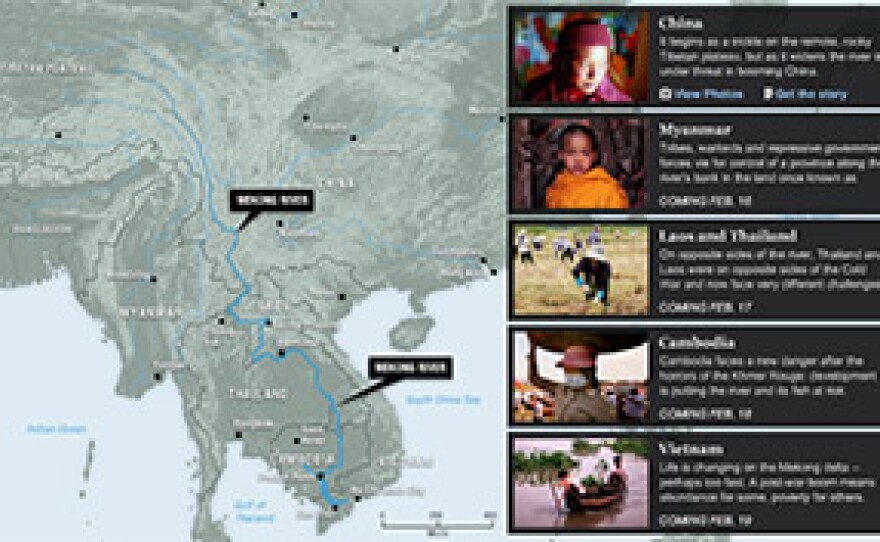During the Vietnam War, U.S. patrol boats used to work the stretch of the Mekong River near the border with Cambodia.
Today, it's tourist boats that bring foreigners on the three-hour trip from the Cambodian capital, Phnom Penh, to the border.
After a quick stop at immigration, it's a short ride to the southern Vietnamese river town of Chau Doc. It's a working town, not really geared to tourists, but there is still much to experience — some of it what you'd expect, some not.
The midday prayer at Chau Doc's Mubarak Mosque might surprise some. It's the oldest, largest and prettiest mosque in town, a place where the call to prayer isn't on tape but is still done live by a muezzin.
The sermon is delivered in Arabic; the Quran, translated into Vietnamese. The congregation is small but devout. The worshippers are a rich mixture of Malay, Middle Eastern and South Asian faces, with a smattering of Vietnamese, too.
Mohamat Yosup, 75, says his ancestors came from Malaysia, Indonesia and India, and have been in Chau Doc for five generations. Others have been here longer, he says; traders brought Islam to Southeast Asia in the 11th century.
Muslims make up just a tiny fraction of the population in this largely Buddhist country, but they are a reminder of the Mekong Delta's rich if sometimes troubled history.
Peace But Not Prosperity
Out on the river, fisherman Nguyen Van Nghia, 46, worries about the present. His lament is the same as that heard upriver in Cambodia — catches are dwindling, with more and more people competing for the fish that remain.
At least it's better than it was during the war, he says. Then, the Americans had a base here, and there was a lot of fighting. And when that ended in 1975, he says, there was trouble with the Cambodians.
Now, there is peace. But that peace hasn't brought him prosperity — far from it.
He says he has a TV, but no money to pay for electricity. He has a house, but not enough land to grow anything. Some days, he says, he can't catch enough fish to even pay for gas.

Vietnam's rapid economic growth in the past decade has lifted many out of poverty. But that's not really the case here in An Giang province, one of the Mekong Delta's least developed and where a lack of jobs has led many to some hard choices.
Impact Of HIV/AIDS
In Tinh Bien, an hour's drive northwest of Chau Doc, Phung Thi Bay describes what happened when her husband went across the border to Cambodia to look for work. While there, the 30-year-old says, her husband visited sex workers and contracted HIV, then he died shortly after returning home. She got tested and found out she was HIV-positive, too.
Bay tells her story at an AIDS clinic, where there is no shortage of patients. Nearly 300,000 people in Vietnam are HIV-positive.
"Some of the patients are women infected by their husbands. Other patients are drug addicts. And some are women who went to work in Cambodia, then fell into prostitution and got infected that way," she says.
But there is some good news: Bay and many others like her are getting treatment, with funds provided by a former enemy, the U.S.
The U.S. government is frequently criticized for doing too little to help Vietnam deal with the long-term effects of the defoliant Agent Orange, which it used on the country during the Vietnam War.
But the government doesn't get much credit when it comes to the help it provides in other areas, such as the $300 million it has spent over about five years on AIDS treatment and education. The funds help pay for anti-retroviral drugs for more than half of the 32,000 Vietnamese now receiving treatment, including Bay.
The Fish Farm Alternative
Three hours downriver is the bustling port city of Can Tho, another familiar name from the war with the Americans. Now, it is a fast-growing, wealthy and vibrant city by local standards, and a transportation hub for the delta, where fast boats leave for far-flung river towns every few minutes.
Can Tho is a city looking firmly to the future, but one where echoes of the past still resonate.
The Vietnam War ended 35 years ago. But on a recent morning, students at Can Tho University learn to field-strip Kalashnikov assault rifles. The drills are mandatory, though less frequent than they were in the past. And these days, the Americans are not the enemy, if Vietnamese bloggers are to be believed, but Vietnam's expansionist neighbor to the north, China.
Yet commerce, not conflict, seems to be the priority for most here.
Fishermen complain of a dwindling catch. But fish farming has grown dramatically in the past decade, and it has helped raise the living standards of many.
At feeding time, entrepreneur Nguyen Thi Loan talks about how a few years ago, she started with just a single cage. Now, she has more than half a dozen cages and three full-time employees. She says most of her fish is sold up north in Hanoi, the Vietnamese capital. The country also exports fish to Europe and the U.S.
Nguyen says her village used to be known for exporting its daughters — as brides to lonely businessmen from Taiwan — but not so much anymore. Nguyen and her husband say they now make about $17,000 a year raising fish, an almost unheard of sum just a decade ago and one that makes them solidly middle class today.
Her main concern now is the river's health. Overdevelopment, she worries, could poison the Mekong and her business.
Environmental Threats
In Can Tho, I stumble onto a conference about the Mekong and a more familiar river — the Mississippi in the United States.
Stan Ponce is central regional director for the U.S. Geological Survey, one of the conference sponsors.
"There are tremendous similarities between the Mississippi River system and the Mekong River system, both in terms of their culture and the economic development and the viability of the basins," he says.
"We feel we can learn a lot from what's been done on this river because it does not have the levies, it does not have the extent of the dam structure that we have. So as we look at long-term restoration of the Mississippi River system, we feel like we have a lot to learn from what's going on in the Mekong River system," Ponce says.
It's a river system that environmentalist Ky Quang Vinh says is now under threat, especially here in Vietnam.
Ky says he is worried about overdevelopment and the dams planned or already built upriver in China, Laos and Cambodia. He is also worried about climate change and the effect rising sea levels and seawater will have on the freshwater of the delta ecosystem. He is hoping the countries that share the river will work together to protect the river as a resource for the future.
The River's End
Thirty miles downriver, we're close to the end of the journey, in the delta town of My Tho. The sunrise is sublime and the mouth of the river is just an hour away by speedboat, when the driver drops a bombshell.
He says the river police won't let us go any farther. Foreigners aren't allowed that close to the mouth, just local fisherman, and even they get their papers checked, he says.
No amount of money would change his mind, and with good reason: The police here are a notoriously hard bunch, more so lately after frequent clashes with local farmers over land disputes.
In the end, we go back to shore — and find an enterprising taxi driver willing to take us by land.
Two hours later, at 9 a.m., I make it to one of the nine mouths of the Mekong, where it empties into the South China Sea.
Frankly, it's a bit of a letdown. There is nobody in sight. The beach is dirty; the light too harsh for any good photos.
On the other hand, it's a relief to finally be here, after two months, six countries and nearly 3,000 miles.
It's also a relief to know the river is still, by most accounts, surprisingly healthy — at least for now.
Producer Tung Ngo contributed to this report
Copyright 2023 NPR. To see more, visit https://www.npr.org. 9(MDAzMjM2NDYzMDEyMzc1Njk5NjAxNzY3OQ001))







